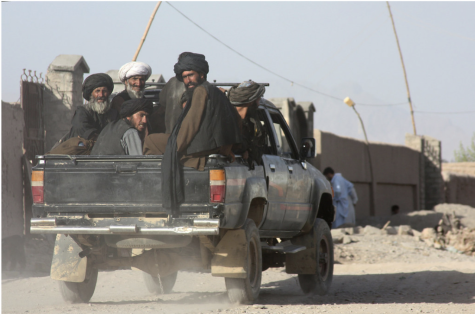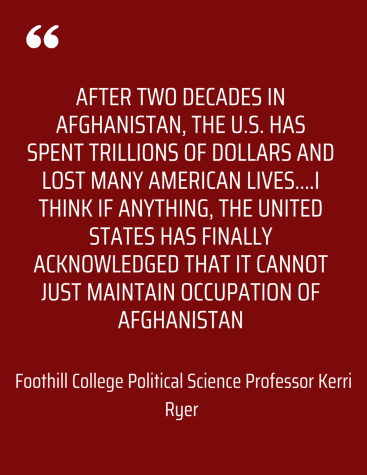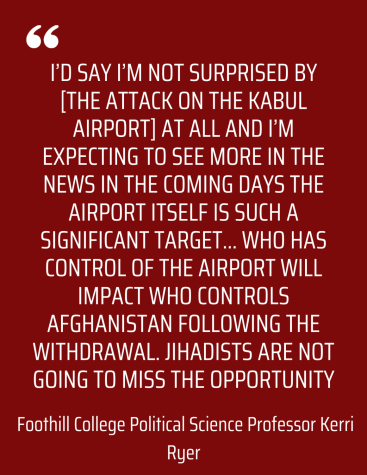Who are the Taliban
Examining the past, present and future of the Taliban after the U.S. withdrew from Afghanistan after 20 years
September 24, 2021

On Sept. 18, 2001, following the events of 9/11, President George Bush authorized force to apprehend the responsible parties and combat terrorism. Invading Afghanistan was one of the major measures the U.S. took to reach its goal.
After the assassination of Osama Bin Laden, the leader of Al Qaeda, the group that executed of the 9/11 attacks, the U.S. focused its efforts on the reconstruction of Afghanistan and “nation-building,”, which included creating peace and stability in the country in addition to championing social issues such as advancing women’s rights. Twenty years later President Biden decided to withdraw U.S. forces from Afghanistan, with the last soldiers leaving on Aug. 30, 2021.
However, groups such as ISIS (Islamic State of Iraq and the Levant), Al- Qaeda, and the Taliban, remain in Afghanistan. The Taliban currently hold immense power. Following the capturing of all but two of Afghanistan’s provincial capitals and the seizing two border crossings, several Taliban fighters overran the Kubal government. Despite the rapid advances of the Taliban, President Biden defended the withdrawal.
English Teacher Vennessa Nava, however, has concerns for the people who remain in Afghanistan with the increased power of the Taliban.
“[The Taliban is] a terrorist organization that has imposed extreme limits on people in Afghanistan and beyond in terms of human rights, women’s rights, LGBTQ rights,” Nava said. “They’re a theocratic kind of organization who imposes or enforces their own religious belief on the other people under their control…. Hearing what they said last week about how all women should stay home because their representatives aren’t yet trained to be able to handle women out in public — I’m very concerned for the Afghan people.”
The organization was formed in the 1990s by a group of students in Kandahar. The students were unhappy with the lack of enforcement of Islamic law after the collapse of the communist regime. But Foothill College Political Science Professor Kerri Ryer traces terrorist organizations like the Taliban to even earlier.
“Following the end of WWII and the creation of Israel, Osama bin Laden formed Al-Qaeda in response to the violence inflicted upon the Palestinians,” Ryer said in an email. “Their goal is to make the U.S. self-implode using terrorist tactics. It is also important to note that the Taliban were rural tribespeople, who were quite poor and lived off the land. Members of Al-Qaeda were/are much more urban and richer, and they view the Taliban as barbaric.”
At the beginning of the war in Afghanistan, the Taliban retreated and collapsed in December of. 2001, early into the invasion of Afghanistan by the U.S. Later, the former Taliban commander at the time, Mullah Dadhullah, was assassinated in an effort by U.S. and Afghan forces as a part of the reconstruction efforts of Afghanistan.
Peace talks with the Taliban resumed in 2020, the U.S. and the Taliban leaders signed a peace treaty. However, Ryer explains that despite the unstable history with the Taliban, the U.S, signing a peace treaty may have been the U.S.’s only option.

“Declaring war against things like terrorism, or drugs, or poverty never end well,” Ryer said in an email. “After two decades in Afghanistan, the U.S. has spent trillions of dollars and lost many American lives. Fighting terrorism is a lost cause because it requires fighting an enemy it cannot permanently erase and thus it is unending. I think if anything, the United States has finally acknowledged that it cannot just maintain occupation of Afghanistan.”
However, similar to Nava, senior Sriya Vennam believes the decision to withdraw puts the people who remain in Afghanistan at risk.
“I feel like Biden knew that [the withdrawal] would cause confusion,” Vennam said. “The deadline that he put was really close to when they evacuated. ….I feel like the people in Afghanistan [who are] still there are going to have to follow Sharia Law, which is what the Taliban are going to enforce.”
Technology has increased the reach of groups like the Taliban, allowing them to pose a greater threat. Although Professor Ryer believes that the Taliban is a threat, she says other groups such as ISIS are more dangerous and willing to use violence and theorize about the future for Afghanistan.

“Now that the U.S. is out of Afghanistan, the state is vulnerable to another civil war as these three groups — the Taliban, Al-Qaeda, and ISIS — will fight each other for power and control,” Ryer said in an email. “It just demonstrates that either the Taliban have failed to get ISIS under its control, or that they have negotiated deals with them that are in direct conflict with the agreement they made with the United States.”
Consequences have already emerged, with an ISIS attack on the Kabul airport in which 13 U.S. service members and 60 Afghan citizens were killed. Ryer commented about how, in the future, women’s education and rights and to LGBTQ+ rights may be jeopardized.
“I would expect the Taliban to enforce a strict adherence to Sharia law and ‘punish’ anyone who assisted the ‘infidels,’” Ryer said in an email. “I’d say I’m not surprised by [the attack on the Kabul Airport] at all and I’m expecting to see more in the news in the coming days the airport itself is such a significant target, not just as a symbol and location of the West, but strategically —who has control of the airport will impact who controls Afghanistan following the withdrawal. Jihadists are not going to miss the opportunity.”
